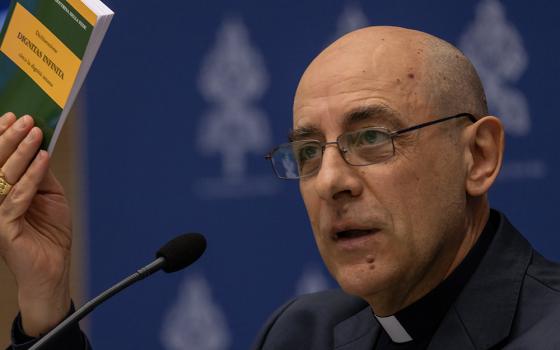Who would have thought that it would fall to bad-girl comedian Sarah Silverman to be the adult in the room at the first night of the Democratic National Convention? After a day of Bernie Sanders supporters embarrassing themselves, she was the first Sanders supporter to strike the right note, saying a "vital part of [Bernie's] movement is making sure Hillary is our next president." And, having ID'd herself as a Sanders supporter, Silverman did not flinch from stating the obvious: "Can I just say to the Bernie or Bust people: You're being ridiculous."
Until Silverman's remarks, it was not clear how the evening would turn out. Earlier in the day, Sanders supporters booed and heckled anyone and everyone who mentioned Hillary Clinton's name from the rostrum. N.B. Most Sanders supporters and delegates have accepted reality and are supporting Clinton, but do not underestimate the power of a few nasty rejectionists to find their way to an MSNBC or Fox News camera. I kept thinking of the Lionel Trilling line: There is a moral obligation to be intelligent.
At an offsite event held earlier in the day by Sanders, even he was booed when he urged his supporters to back Clinton. One Colorado delegate, wearing a plastic marijuana necklace, told a reporter on camera that Clinton "was not yet the nominee" as if something was going to transpire in the final 24 hours to change the fact that she got 4 million more votes than Sanders. One of his supporters complained that the senator from Vermont had to go last among the speakers, unaware that this is the coveted spot, like a bride in the wedding procession or, perhaps a better analogy under these circumstances, like the corpse at a funeral. Even erstwhile liberal darling Rachel Maddow concluded "It is hard to explain what the grievance is, especially when you've gotten Debbie Wasserman Schultz's head on a platter."
The mood in the hall began to shift as some non-politicians addressed the room. Pam Livengood, a grandmother from Keene, N.H., raising her grandchild because her daughter is fighting addiction, spoke powerfully about her situation and about Clinton's support for her and her plan to address the problem. The Bernie or Bust crowd knew enough not to boo her. Astrid Silva, a Dreamer who was brought to this country without papers as a child, reminded the room what a real grievance looks like and explained the stakes in the election. Jason Collins, the openly gay former NBA player, and his straight twin brother, painted a picture of inclusion that the Democrats have championed and the Republicans have mocked. Sen. Cory Booker brought the room to their feet with a powerful speech that ended with the audience chanting "We will rise," a slight variation on the Maya Angelou poem Booker cited in his talk.
First Lady Michelle Obama then delivered the most effective speech of the evening, skewering Trump without mentioning his name and validating Hillary Clinton in ways no one else could. She spoke not only about the need for a president who is measured and well-informed, but also about the role model part of the job, how she and the president tried to serve as role models for their own kids ("When they [political opponents] go low, we go high.") with the acute awareness that the first family is a role model for all kids. Mrs. Obama got choked up when she said that Hillary had single handedly taught her own girls that they can be president when they grow up, and we all were reminded that there is history in the making -- and the American people like making history. Mrs. Obama's most effective verbal charge against Trump tackled his signature slogan, his promise to make America great again. Obama reminded the room that she lives in a house that was built by slaves, and her daughters play on the White House grounds, and this country is plenty great already. It was very, very powerful.
Sen. Elizabeth Warren went next and she helped shift the feeling in the room away from the disunity caused by the Bernie or Bust crowd by beginning her remarks with extensive compliment of the senator and his campaign. This did not keep that same group from heckling her, too. I gotta say: When you heckle Elizabeth Warren, you are no longer a liberal. She complimented the Obama administration for the Affordable Care Act and Dodd-Frank, but urged the party to keep moving forward. Why her speechwriters did not happen upon the obvious turn of phrase, from Clinton's slogan "stronger together" to "forward together" I do not know, but that was the thrust of her speech as she ticked off a set of policy objectives Democrats share. Interestingly, although she mentioned a few culture war issues in passing, 95 percent of Warren's speech was focused on economic justice issues. This allowed her to attack Trump and speak to issues that play well among voters that Democrats will need in November. It was not the best speech I have seen Warren give, but it served its purpose.
Then came Bernie himself. He spent several minutes patting himself and his supporters on the back, citing their achievements. At first I thought this was odd, but it was necessary, it validated the emotions of his supporters and set him up for the pivot: "I understand that many people in this convention hall and around the country are disappointed ... . I hope you take enormous pride in the historical accomplishment we have achieved." He noted some of the achievements of the Obama administration. Then, he shifted into a discussion of the stakes in this coming election and hit the key phrase: "Hillary Clinton must become the next president of the United States." He cited several areas of agreement, especially the way the two campaigns forged a consensus plan on funding college education. As Warren, the emphasis was not on the culture war issues, except in passing, but on the core economic issues that animated his campaign. Clinton missed an opportunity: She should have joined Bernie on the stage at the end of his speech, held his hand aloft, and said to the convention crowd, "I'm with him" which, in the course of things, would have prompted him to return the favor.
There was a small group that booed and hissed throughout Sanders' speech. Who are these people? Here we see one of the downsides of social media: it allows people to nurse each other's grievances for a long time. And I hope Sanders and others learned the lesson that if you carelessly call for a revolution and indict your opponent as not only wrong but corrupt, you may lose control of your own troops before the fat lady sings.
What promised to be a chaotic and divisive evening turned out to be less worrisome than feared for the Democrats. Yes, some of the Bernie or Bust people were interviewed, but you could feel the emotion in the room shift from suspicion and nastiness to unity and coherence, even enthusiasm by the time Sanders left the stage. The most important point in that pivot was the result of Clinton's campaign team deploying non-politicians like the Dreamer, the activist for disability rights, the gay basketball player, and the grandma with a drug-addicted daughter. Their testimony stopped the incessant booing and heckling. And, then, Michelle Obama sealed the deal with the best speech of the night.
I did not see any focus groups last night. It will be interesting to see how the undecided voters reacted, especially on the underlying issues that shape a race, e.g., having been reminded of what has been accomplished in the last eight years, and the dismal mess Obama inherited, will we see his approval ratings go up? A higher approval rating for Obama will make the case for Clinton's continuity in a more compelling way than anything she can say or promise. When people say we are on the wrong track, how many will blame the Republicans and how many will blame Obama? How do people feel about the economy? Terrorism? And, on a more personal note, can all these testimonies to Hillary drive down her negatives on questions about trustworthiness and likability? The Democrats have a good, not great, case to make to the American people that they have handled the trust they were given ably. Compared to Trump, that may be enough to break the cycle that limits each party to two consecutive terms, a cycle that was only broken once in the postwar era, in 1988.
Of course, in 1992, Mrs. Clinton's husband defeated the incumbent President George H. W. Bush. Team Clinton needs to remember that 12 years of uninterrupted control of the White House is rare enough and 16 years is even rarer. The next census is in 2020, and it is imperative that the Democrats not lose another year when redistricting is underway. That means it is not enough to win in November; Clinton has to win in such a way that she can have a successful presidency. She and her allies can talk about bringing the country together all they want: The GOP in Congress is unlikely to roll over and accept her agenda unless they are forced to. It is far from clear what Clinton wants to accomplish in her first 100 days in office. She and the party have three days to tell us. Otherwise, she may beat Trump but with no mandate for any particular policy. The gridlock would remain, and it is easy, too easy, to imagine her presidency quickly becoming unproductive and unsuccessful. The good news is, and we can thank Sanders for some of this, there are plenty of progressive economic policies that Democrats and a majority of Americans embrace. She should pick the three or four she wants to run on and talk about nothing else. That won't happen entirely, but if the next three nights are increasingly specific, Clinton will not only contrast herself nicely with the vague promises Trump has made, she will be in a better position to govern come January.
[Michael Sean Winters is NCR Washington columnist and a visiting fellow at Catholic University's Institute for Policy Research and Catholic Studies.]








